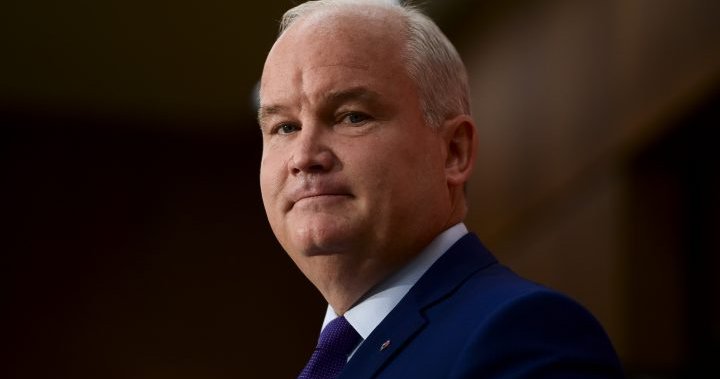Federal politicians are grappling with the country’s legacy of residential schools as July 1 approaches, with the Conservative leader railing against calls to cancel Canada Day while Liberal ministers say it will be a time for reflection.
Tory Leader Erin O’Toole says he’s committed to a renewed nation-to-nation relationship with Indigenous Peoples, but stands firm against so-called activist efforts to “cancel” Canada, particularly on the national holiday.
O’Toole offered his insights on the moment the country finds itself in to members of his caucus and staff gathered in Ottawa before the House of Commons breaks for summer.
Read more:
Three northern Saskatchewan communities ‘pause’ Canada Day
He called the discovery in British Columbia of what are believed to be the remains of 215 Indigenous children from a former residential school “a necessary awakening for our country.”
O’Toole pledged that a government led by him would be dedicated to a renewed relationship with Indigenous Peoples, as speculation swirls that the minority Parliament may be headed toward an election.
The Conservative leader said the road to repairing the country’s relationship with Indigenous Peoples and better equality doesn’t involve attempts to destroy Canada.
“I’m concerned that injustices in our past, or in our present, are too often seized upon by a small group of activist voices who use it to attack the very idea of Canada itself,” he said.

Standing up to cancel culture and the “radical left” was part of the platform O’Toole ran on to win the party’s leadership last summer, where he billed himself as the “true blue” candidate to the Conservative faithful.
He’s also been trying to modernize some of the party’s positions and broaden its support base to include more people, including those who are Indigenous.
Like other federal party leaders, O’Toole has in recent weeks had to respond to the discovery of the unmarked burial site in late May and demands for the government to make better progress on calls to action from the Truth and Reconciliation Commission.
And as Canada Day draws near, the reality and impacts of the historical wrongs done to Indigenous Peoples hangs over not only over Parliament Hill, but cities and towns across the country preparing to mark the July 1 holiday.
Read more:
Belleville to forego Canada Day celebrations this year
The celebratory day, filled with fireworks and flapping Canadian flags, has been viewed with increasing suspension in recent years as more people reckon with Canada’s colonial past and the harm it brought to Indigenous communities.
At a press conference Wednesday, federal Indigenous Services Minister Marc Miller says he has mixed feelings on Canada Day. He drew on his own experience being from Quebec to say he knows the national holiday can be controversial, and is not universally celebrated.
For himself, he said, it’s a time of reflection and a chance to look at “what we are as a country.”
“The flags are still lowered to continue to commemorate the children that were stolen from their communities and taken to residential schools. Those wounds are still very much open in Indigenous communities,” Miller said.

Appearing virtually alongside Miller was Crown-Indigenous Relations Minister Carolyn Bennett, who agreed the holiday should be used to think about Canada’s ugly past.
She said the summer itself will be a time for people to wrestle with the country’s racist wrongdoings, as Canada prepares to mark its first statutory holiday remembering the legacy of residential schools on September 30.
“On Canada Day I will be wearing an orange shirt,” said Bennett.
Read more:
Penticton, Kelowna cancel Canada Day festivities
O’Toole, for his part, spoke out against calls from some to cancel Canada Day celebrations and singled out the actions of activists and those “always seeing the bad and never the good.”
“As someone who served Canada and will soon ask for the trust to lead this country, I can’t stay silent when people want to cancel Canada Day.”
O’Toole, who served in the military for 12 years, says he’s proud to be a Canadian, as are millions of others.
He added that, “We are not a perfect country. No country is. There is not a place on this planet whose history can withstand close scrutiny.”
© 2021 The Canadian Press














































